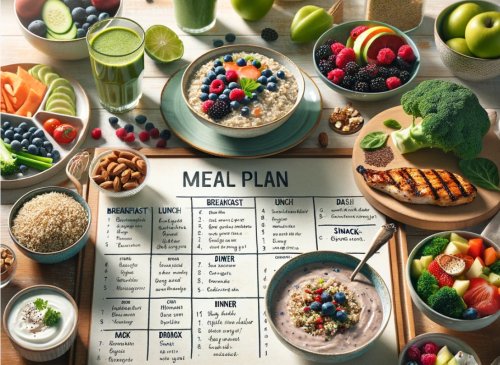A Balanced Life: Mindfulness and Meal Planning for Working Women
In today’s fast-paced world, managing a career, family, and personal time can feel overwhelming. For working women, the pressure to balance it all often leads to burnout. However, by incorporating mindfulness and meal planning into your daily routine, you can create a healthier, more balanced lifestyle that leaves you feeling energized, organized, and in control. Let’s explore how these two simple practices can revolutionize your day.
What is Mindfulness for Working Women?
Mindfulness is more than just a meditation practice; it’s a way to bring awareness and presence into your everyday life. For working women, mindfulness means slowing down and paying attention to the present moment, whether it’s during a hectic meeting or while preparing a meal for your family. Practicing mindfulness can help reduce stress, improve focus, and enhance your overall well-being.
 Why Meal Planning?
Why Meal Planning?
Meal planning is a tool that simplifies your weekly routine, ensuring you’re eating nutritious meals without the daily hassle of deciding what to cook. For busy women, it can feel like a game-changer. Meal planning not only saves time but also helps you make healthier choices, and it eliminates the daily stress of last-minute grocery shopping or unhealthy takeout.
Combining mindfulness with meal planning creates a routine that supports your mental, emotional, and physical well-being.
The Mindful Approach to Meal Planning
Rather than seeing meal planning as a chore, let’s approach it mindfully. When you sit down to plan your meals, do it with intention:
- Set Aside Time: Dedicate a quiet moment each week to focus on your upcoming meals. Be fully present during this time—think about the kinds of meals that will nourish your body and provide you with the energy you need to tackle your week.
- Focus on What You Love: You don’t need to reinvent your diet every week. Stick with meals you and your family enjoy and incorporate seasonal produce. This mindful practice ensures you’re making choices that you know work for you, avoiding the overwhelm of trying new, complicated recipes on a busy work night.
- Simplify with Favorites: Start by listing your staple meals and keep them in rotation. This way, you save time in both planning and grocery shopping. For instance, your staples could be simple dishes like grilled chicken, roasted vegetables, or a hearty salad.
Benefits of Mindful Meal Planning
- Reduced Stress: When you have your meals planned, you can remove one daily stressor from your life. You’ll know exactly what’s for dinner, eliminating the evening scramble.
- Healthier Choices: Mindful meal planning encourages healthier eating habits. Since you’re taking the time to consciously choose what to eat, you’re less likely to opt for fast food or unhealthy snacks.
- Saving Time and Energy: By planning your meals in advance, you’ll spend less time thinking about food each day. This gives you more time to focus on other areas of your life—whether it’s work, family, or self-care.
How to Get Started: Practical Tips for Busy Women
- Start Small: If meal planning is new to you, begin by planning just a few dinners for the week. Keep it simple—choose meals that don’t require a lot of prep, and slowly add more meals as you become comfortable.
- Batch Cook for Busy Days: On weekends, take time to prep larger quantities of food that can be eaten throughout the week. This way, you’ll always have a healthy option ready when life gets hectic.
- Invest in Containers: Portion control and food preservation are key to successful meal planning. Invest in high-quality food containers that make storing and portioning your meals easier.
- Be Flexible: While planning is important, allow yourself flexibility. If a meal doesn’t go as planned or if your schedule changes, don’t stress. The goal is progress, not perfection.
 Mindfulness Tips to Enhance Your Routine
Mindfulness Tips to Enhance Your Routine
Be Present While Cooking: Cooking doesn’t have to be a rushed, stressful task. Turn it into a mindful activity by focusing on each action—chopping vegetables, stirring the pot, or smelling the food as it cooks. This not only reduces stress but makes the process more enjoyable.
Gratitude with Each Meal: Before you sit down to eat, take a moment to appreciate the food in front of you. Reflect on the effort you put into preparing it and the nourishment it provides your body.
Mindful Eating: Instead of rushing through your meals, eat slowly and savor every bite. This practice helps you tune into your body’s hunger and fullness cues, promoting better digestion and a more satisfying eating experience.
Why Mindfulness Matters for Working Women
The benefits of mindfulness go beyond just stress reduction. It’s about creating a mindset that allows you to handle daily challenges with grace and resilience. Whether you’re juggling deadlines at work or managing your household, practicing mindfulness helps you stay grounded and focused on what truly matters.
Meal planning, when done mindfully, can also be a form of self-care. It shows that you’re taking the time to nourish yourself and your family, all while keeping the chaos of everyday life at bay.
In Conclusion: Combining Mindfulness and Meal Planning for a Balanced Life
For working women, time is a precious commodity. But with mindful meal planning, you can save time while also improving your health and well-being. By being present and intentional in both your meal prep and daily activities, you’ll find that you have more energy, less stress, and a greater sense of control over your life. Start small, be patient with yourself, and enjoy the process of nourishing both your body and mind.
With love and positivity,
Jennifer 💛






